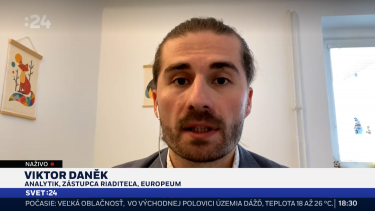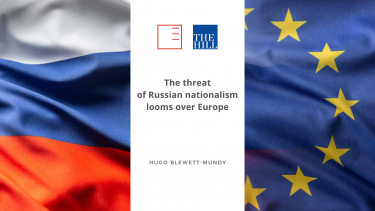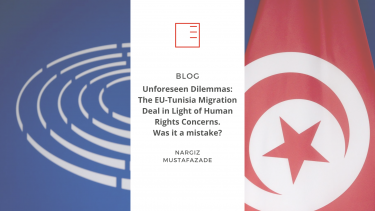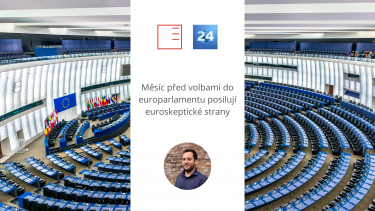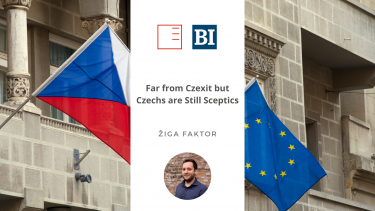RTVS | Does von der Leyen have a clear opponent after the Spitzenkandidaten debate?
Five candidates for the post of European Commission chief clashed in a Europe-wide debate on Thursday. Two factions did not field a candidate. The system of spitzenkandidaten, i.e. the leading candidates of each group for the post of president of the European executive, was created as an effort by MEPs to increase transparency in the filling of the highest posts in the European Union, which clearly includes the president of the Commission. Who will be the one who will form the majority after the elections and does the current head of the Commission, Ursula von der Leyen, have a significant opponent among the other spitzenkandidaten? Viktor Daněk, deputy director of EUROPEUM Institute, analysed the debate for RTVS.
Show moreThe Hill | The threat of Russian nationalism looms over Europe
The threat of Russian nationalism poses a serious danger to Europe, as emphasized by the EU's High Representative for Foreign Affairs and Security Policy Josep Borrell in his speech in April. Russia is attempting to reassert its influence, particularly through its war against Ukraine, which undermines European security. What impact does the reemergence of Russian nationalism, supported by China, have on European security, and how should the West respond to this geopolitical reality? In his commentary for the American news website The Hill, Hugo Blewett-Mundy, an external collaborator and research fellow at EUROPEUM Institute, addresses this topic.
Show moreBLOG | Unforeseen Dilemmas: The EU-Tunisia Migration Deal in Light of Human Rights Concerns. Was it a mistake?
Tunisia has become the main exit point for asylum seekers and refugees, especially those from sub-Saharan Africa. The EU, faced with a surge in arrivals to Lampedusa, has bolstered its cooperation with Tunisia, signing a Memorandum of Understanding with President Kais Saied. However, questions arise over the EU's handling of human rights abuses in Tunisia, reminiscent of past agreements with Turkey. Nargiz Mustafazade, a trainee in the Brussels office of EUROPEUM Institute, writes about this topic in her blog.
Show moreČT24 | Euroskeptic parties strengthen a month before the European Parliament elections
The European elections are about a month away. Czechs will vote for 21 of the 720 MEPs. This will be the first election since Brexit, the Covid-19 pandemic or the start of the Russian invasion of Ukraine. Turnout is expected to be higher than in the last elections five years ago, with right-wing and Eurosceptic parties strengthening. Žiga Faktor, deputy director and head of EUROPEUM Institute's Brussels office, described the possible reasons for daily broadcast of Czech TV.
Show more
BalkanInsight | Far from Czexit but Czechs are Still Sceptics
This year the Czech Republic celebrates 20 years since joining the European Union. Czechs are very sceptical about the EU, despite the fact that about 70 percent acknowledge that the Czech Republic benefits from EU membership and would vote to remain. Sceptical perceptions of the Union could be changed by the country's new pro-European leadership. Žiga Faktor, head of the Brussels office and deputy director of the EUROPEUM Institute, commented on this topic for BalkanInsight.
Show more
Právo | Von der Leyen wants to continue leading the EU
As expected, Ursula von der Leyen has confirmed her interest in continuing as President of the European Commission. Since her arrival, she has faced crises such as Brexit, the global pandemic, the battle over vaccines and the Russian invasion of Ukraine. The announcement of her candidacy was analysed by Viktor Daněk, deputy director of the EUROPEUM institute, in Deník Právo.
Show moreBLOG | The EU’s communication fiasco: A failed response to the Hamas attack on Israel
The EU didn't manage to communicate well regarding the Hamas attack on Israel. This blog delves into the shortcomings of the EU's response, shedding light on the complexities and challenges faced in handling the aftermath of this sensitive geopolitical situation. Written by Adam Horry.
Show moreBLOG | The case of Lampedusa: A humanitarian crisis in the midst of a dilemma between EU solidarity and states’ sovereignty
In September 2023, Lampedusa, a small Italian island, faced an unprecedented surge in arrivals, sparking a heated debate within the EU. With conflicting perspectives from leaders like Ursula Von der Leyen, the focus has shifted from humanitarian aid to security concerns. This blog written by Nicolas Rouillard explores the complexities of the crisis, the divergent opinions, and the critical decisions ahead that could reshape Europe's approach to migration.
Show moreAnalysis | To be or not to be: Czech Republic’s ambiguous attitude towards the 3SI | Anticipating the 2023 Three Seas Initiative Bucharest Summit. Advancing
Discover Jana Juzová's article titled "To be or not to be: Czech Republic’s ambiguous attitude towards the 3SI" in the working paper series Anticipating the 2023 Three Seas Initiative Bucharest Summit. Advancing the common agenda. Juzová, a senior researcher, provides valuable insights into the complexities of the Czech Republic's stance on the 3SI. Explore this thought-provoking analysis today to understand the dynamics surrounding this strategic initiative.
Show moreReport | European Summer School 2023
In July 2023, the Institute for European Policy EUROPEUM organized its 20th edition of the European Summer School in Prague. This year’s jubilee edition programme focused on the complexities of climate change and the EU’s approach and solutions towards this ever-growing issue, entailing climate change’s political, economic, security, and social aspects.
Show more PDF
Staroměstské náměstí 4/1
Prague 1 - Staré Město
110 00
tel.: +420 212 246 552
email: europeum@europeum.org
https://www.europeum.org
